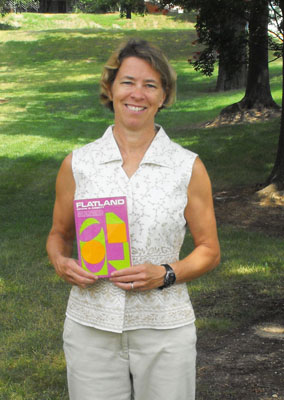Dr. Jennifer L. Etnier
Professor

Flatland
by Edwin Abbott
I selected Flatland because of the impact that it had upon me when I read it in the 7th grade and the impact it continues to have on my today. Flatland is an allegorical tale in which the main character is a square. This two-dimensional being explains to the reader the roles of other shapes in his world – women who are represented as lines, soldiers and working class who are isosceles triangles, tradesmen who are equilateral triangles and so on. In this world, social class is equivalent to the number of equal sides that a being consists of, so women are the lowest class, and priests are the highest social class and are made up of those who have the greatest number of sides (approaching a circle). Although I did not fully understand the hegemony expressed in this book as a teenager, I do remember being struck at the time by the conscious use of power and tools of language by the "upper classes" to maintain control over the "lower classes". This book brought to my consciousness observations that I was making and questions that I had (and continue to have) about our own social and political landscape. The square then goes on to travel to other dimensions. He travels to a land of no dimensions where a point believes he is the only being in existence and that, therefore, he is all knowing and all powerful. He travels to a land of one dimension where a line cannot fathom the existence of other dimensions despite the square attempting to provide such an explanation. Lastly, he travels to a land of three dimensions and after much soul searching comes to accept that there is a dimension beyond that which Flatlanders can perceive. These travels to other dimensions also struck and continue to strike a chord with me as I make efforts to remain open-minded and to cope with the questions surrounding our understanding of reality and our very existence. I am honored to have the opportunity to contribute Flatland to the
UNCG Library.